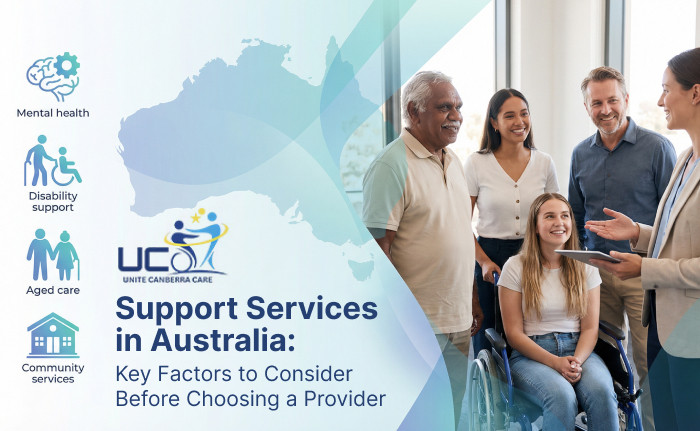

When it comes to the care and support in Australia, selecting the right support services is the foremost concern in Australia. If you are looking around the options available in the National Disability Insurance Schemes, aged care, or community support services, the provider you choose will play a significant role in shaping your wellbeing and quality of life. With lots of choices offered, it can feel irresistible to know where to start.
At Unite Canberra Care, we focused on empowering individuals to make informed choices. It is in line with their goals, values, and demands. Here, we will discuss the prime factors to consider before selecting a support services provider in Australia. It ensures that you, as well as the loved one, get high-quality and person-centred care.
1. Accreditation and Compliance
First of all; confirm that the provider is fully accredited and follow up on the government regulations. For NDIS participants, it means going with an NDIS-registered provider. Accreditation make sure that provider meets the national quality and security standards. It lets you have real confidence in the ability to give professional and reliable care.
Accreditation safeguards your rights, ensures answerability, and cuts down the possibilities of poor-quality services.
2. Special range of services offered
Almost every provider comes to give different levels of support. Some specialise in disability services, while others give a special mix of aged care, home care, or even community participation programs. It’s essential to check their service offerings and find out if they match the present and future demands.
Important tip
Always choose a service provider that gives a flexible and customized solution so you can adapt as the demands grow up.
3. Customized Approach
The top quality support service must ever place the individual at the base of the care. It implies creating customized care plans that respect your goals, cultural background, and choices. Providers who accept an individual approach will listen, engage you in decision-making, and adapt their services to suit the lifestyle of a person.
Personalized care allows for better dignity, independence, and long-term comfort.
4. Staff Training and Expertise
No doubt, the quality of care is completely demands on the people available to deliver. You should ask the staff for the qualifications, training programs, and even ongoing professional development opportunities. The staff should be professional, compassionate, and well-supported, which is better set to provide safe and efficient care.
Prime considerations
Look if the service provider spends money on regular training, like cultural sensitivity, disability knowledge, and health security standards.
5. Transparent service and friendly Communication
Open communication is considered the base of trust. A good provider is always clear about the costs, services, and expectations. They should also support regular feedback. It makes it simple for you to raise concerns or request modifications to your care plan.
Why is it important
Transparent communication ensures that you always feel informed and stay under complete control.
6. Flexible and highly responsive services
Conditions in life and care demands can change over time. Select a provider who is quite flexible and responsive, with the ability to adapt to new demands quickly. If it is increasing the hours of support, adjusting services, or adding new plans, flexibility turns your care practice to run smoother.
Pro tip:
It is essential to ask how quickly providers can respond to urgent demands and make changes in the support plan.
7. Community Engagement and Reputation
A provider’s reputation can share information on the quality of their services. It is essential to look for the testimonials, online reviews, and involvement of the community. Providers who are actively occupied in the community and keep positive feedback are more expected to deliver reliable and best care.
Helpful Tip
It is better to ask friends, family, or even peers for the right recommendations, and research independent reviews to make the right decision.
8. Financial Clearance and Value for Money
The support service can engage in the noteworthy financial commitments. Make sure the provider is open about costs, service additions, and payment structures. Compare costing with the quality of care offered to ensure you are receiving value for cash.
Why it matters
Clear financial transparency helps you to keep different from the unexpected fees and assists you with the right budget.
9. Technology and Innovation
Advanced support services gradually mix technology to boost care. Starting from the digital communication tools to pioneering assistive devices, providers who hold technology can improve service competence and client freedom.
Example
10. Cultural Sensitivity and Inclusivity
The country Australia is a diverse in nature. It is essential that support services esteem linguistic, cultural, and personal choices. Look for the provider that has policies and practices in place to support inclusivity and personalized to meet diverse demands.
Why it matters
It add on the level of care and creates a secure and respectful set up for people needs support.